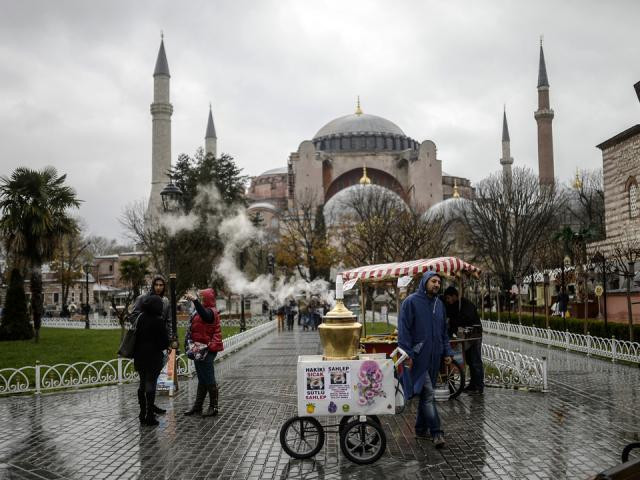Pre-dawn Quran readings stoke fears over Istanbul's Hagia Sophia
Foreign Minister Nikos Kotzias has written to the UN's cultural heritage agency UNESCO to complain about its use

Foreign Minister Nikos Kotzias said he had written to the UN's cultural heritage agency UNESCO to complain about its use. PHOTO: AFP
"In the name of God, the compassionate and the merciful..."
Nothing especially unusual -- except the cleric is reading not in a mosque but what is officially a museum. And the museum is the Hagia Sophia, one of the single most emblematic edifices of human civilisation.
Muslims in Turkey demand right to pray at Hagia Sophia
A masterpiece of architecture, the Hagia Sophia was first built as a church in the sixth century in the Christian Byzantine Empire.
It was almost immediately converted into a mosque following the conquest of Constantinople by the Muslim Ottomans in 1453 with minarets built to flank its magnificent basilica.
It became a secular museum in a key reform of the new post-Ottoman Turkish authorities under Mustafa Kemal Ataturk in the 1930s, making the Hagia Sophia universal heritage for peoples of all faiths.
But critics have long accused the ruling Islamic-rooted Justice and Development Party (AKP) of President Recep Tayyip Erdogan of harbouring a hidden agenda to turn the Hagia Sophia back into a mosque as a symbol of Turkey's status as a majority Muslim nation.
Last year, a Muslim cleric recited the Quran in the Hagia Sophia for the first time in 85 years to mark the opening of an exhibition.
But this Ramadan the Turkish authorities have gone a step further, with the state TV religion channel Diyanet TV broadcasting every day of the month the Quran recitation by a different senior Turkish cleric, the most extensive use of the building for religious purposes since it became a museum.
The recitation takes place at the time of suhur, the pre-dawn meal consumed by Muslims as they prepare for a day of fasting, hours before the thousands of tourists who sweep through the Hagia Sophia daily begin queueing outside the turnstiles.
Protestors demand conversion of Hagia Sophia into mosque
The recitation, broadcast live on Diyanet TV, aroused a furious reaction from Greece, which for years has warily eyed what Athens sees a creeping Islamisation of the building.
"This kind of obsession -- bordering on bigotry -- for holding Muslim ceremonies in a monument that belongs to the patrimony of humanity is incomprehensible and shows a lack of respect and contact with reality," Greece's ministry of foreign affairs said in a statement.
Foreign Minister Nikos Kotzias said he had written to the UN's cultural heritage agency UNESCO to complain about its use.
US State Department spokesman Mark Toner said Washington "would encourage the Turkish government to preserve the Hagia Sophia in a way that respects its traditions and its complex history."
But in a spiteful diplomatic row, Turkey's foreign affairs spokesman Tanju Bilgic said Greece's statement was "unacceptable" and said Athens should look more closely at its own record on religious freedoms.
He said Greece has not given permission for the construction of a mosque in Athens for years, violated the religious freedoms of its remaining Muslim minority and "mistakes being against Islam for being modern."
Some Turkish officials -- including a recent culture minister -- have voiced a desire to see the Hagia Sophia become a mosque again but this has never been an official policy.
Erdogan had already caused some shudders when on May 29 he led a ceremony attended by hundreds of thousands -- complete with a aerobatic stunt display -- to celebrate the conquest of Constantinople.
Both sides may want to keep the dispute in check however, given the relatively robust relations between Turkey's AKP government and Greek Premier Alexis Tsipras, particularly on the migration crisis.
Turkey has also pleased Greece in recent years by offering greater respect for Orthodox traditions, including this year allowing Epiphany Day to be celebrated in the Aegean city of Izmir for the first time in over nine decades.
But critics also point to a 13th century Byzantine church in the Black Sea city of Trabzon which was turned into a mosque in the sixteenth century and then became a museum in the 1960s.
After a lengthy legal battle, Turkey's religious affairs authority took repossession of the building -- confusingly also called Hagia Sophia -- and in 2013 it was reopened again to Muslim believers. It is now the subject of restoration works which have raised concern about its Byzantine frescos.
"As there are already three mosques in the area, why has the Hagia Sophia church also been turned into a mosque instead of being preserved as a historic monument?" asked Garo Paylan, MP for the opposition Peoples' Democratic Party (HDP).



















COMMENTS
Comments are moderated and generally will be posted if they are on-topic and not abusive.
For more information, please see our Comments FAQ